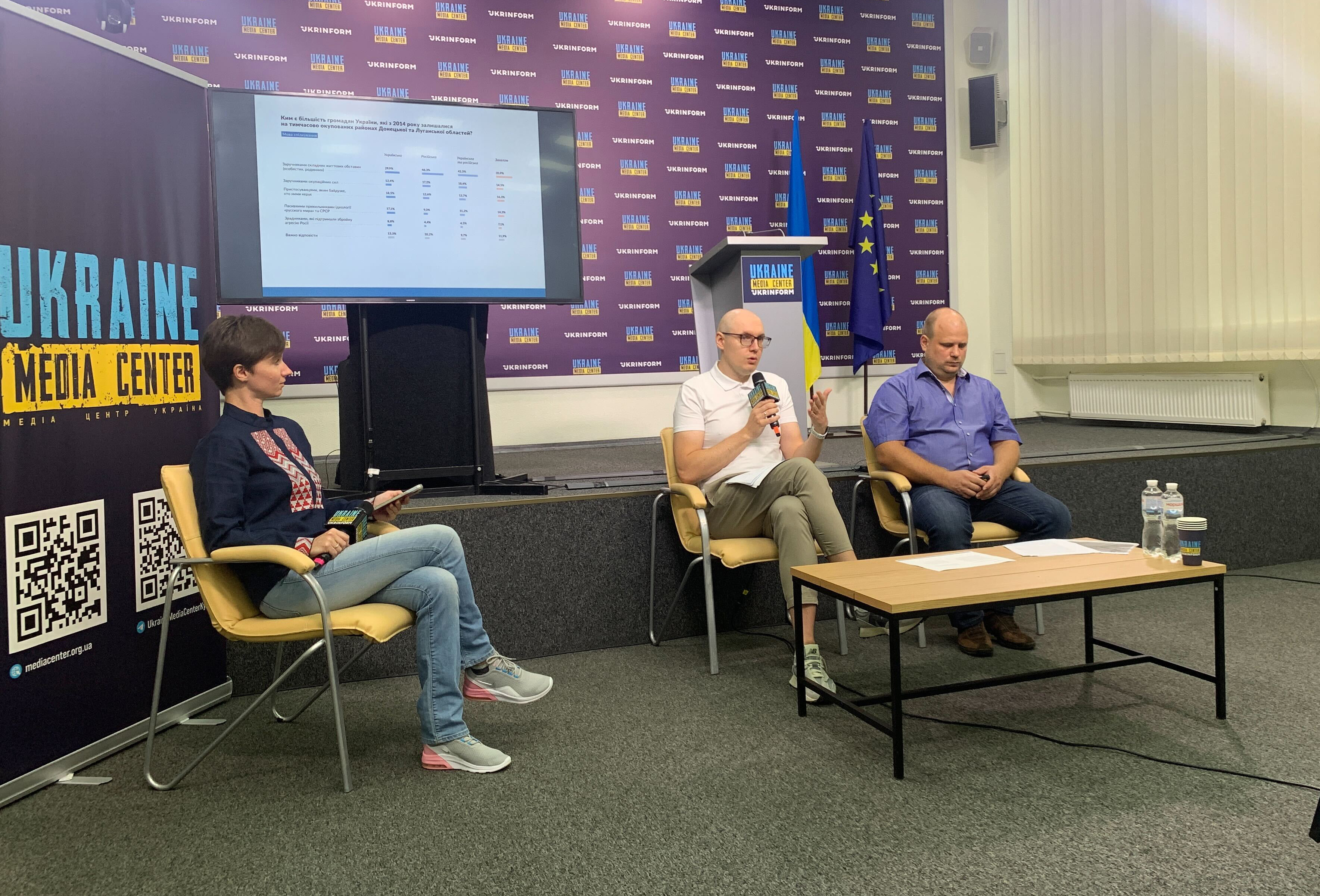According to research carried out by Civil Network OPORA, 76.6% of Ukrainians perceive residents of the occupied territories as victims of circumstances and hostages of the occupation forces. This applies to residents of territories that were occupied after February 24, 2022, as well as residents of Crimea and certain districts of Donetsk and Luhansk oblasts that have been under Russian occupation since 2014. OPORA’s analysts Anatoliy Bondarchuk and Dmytro Bashtovyi delivered a presentation of research results at Ukraine Media Center - Ukrinform press event held on August 23, 2023.
Most Ukrainians (76.6%) perceive residents of territories occupied after February 24, 2022, as victims of circumstances and hostages of the occupation forces, while only 13.2% think of them as traitors, temporizers or lukewarm persons who are indifferent to Ukraine. In particular, 44.7% of interviewed Ukrainians share the opinion that those who live under Russian occupation are primarily hostages of personal and family circumstances, while 31.9% of respondents regard them as hostages of the occupation forces. This trend is also observed in Ukrainian public attitude towards those who have been living under Russian occupation since 2014.
According to Anatoliy Bondarchuk, the respondents living in Eastern (80.7%), Southern (79.3%) and Central Ukraine (78.2%) are more sympathetic to those who found themselves under Russian occupation after the start of the full-scale invasion; the same holds true for the respondents who speak Russian (82.8%) or both Ukrainian and Russian (79.9%) on a daily basis.
Residents of Western Ukraine and Ukrainian-speaking citizens have less sympathy for those who live in the recently-occupied territories. However, even in these two groups the majority of respondents (70.7% and 73.3% respectively) perceive those who have been under Russian occupation since February 24, 2022, as victims of circumstances.
The respondents have a slightly more negative attitude towards those Ukrainian citizens who have been living under Russian occupation for the past 9 years – in Crimea and certain districts of the Donetsk and Luhansk oblasts (CDDLO)
Respondents make practically no distinction between residents of occupied Crimea, Donetsk and Luhansk regions. 47.5% of respondents perceive residents of Crimea as hostages of circumstances and occupation forces, while 50.4% hold the same opinion about those who live in the CDDLO. On the other hand, 38.7% of respondents perceive residents of Crimea as traitors, temporizers or passive supporters of Russia, and 37.7% hold the same opinion about those who live in the CDDLO.
Respondents from Southern Ukraine are more sympathetic to those who have been under Russian occupation since 2014 (54.8% have a positive attitude towards those who live in Crimea, and 67.8% have a positive view of CDDLO residents). The same holds true for respondents from Eastern Ukraine (56.3 % and 58.5% respectively), Russian-speaking respondents (56.5% and 63.5% respectively), respondents who speak Ukrainian and Russian (57.3% and 60.9% respectively), and respondents aged 60 or older (49.5% and 52.1% respectively).
Civil Network OPORA also asked Ukrainians about their attitude towards those who obtain Russian passports and cooperate with the occupation authorities.
According to Dmytro Bashtovyi, 76.5% of respondents share the opinion that Ukrainian citizens obtain Russian passports for physical security reasons, 36.2% – for financial reasons. Meanwhile, 31.7% of respondents are convinced that our citizens obtain Russian passports because they support Russia, 14.5% - for the purpose of performing resistance activities.
The respondents also answered the question as to who should bear criminal responsibility for cooperation with the occupation authorities.
The vast majority of respondents (94.5%) would like to institute criminal proceedings against security-service agents and military officers who defected to the side of occupation authorities, 92.8% – against those who helped the Russian government to organize so-called “elections” and “referendums” in the occupied territories of Ukraine, 92% – against those who ran as candidates in so-called “elections”.
For additional information please refer to:
Anatoliy Bondarchuk
+38 096 918-74-08
Dmytro Bashtovyi
+38 066 457-93-07
